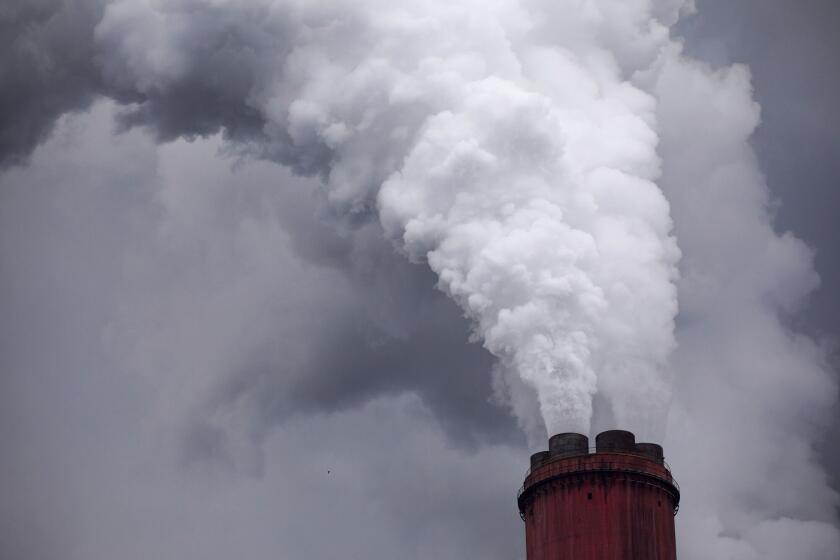Powerless at the pump
- Share via
I ALMOST FEEL SORRY for President Bush. The poor man is trying to pay homage to French civilization by taking the month of August off, but we just won’t leave him alone.
Not only are antiwar activists camped outside his ranch in Crawford, Texas, but soaring gas prices are now clouding the economy’s otherwise rosy outlook. On Tuesday, Wal-Mart whined that high gas prices are affecting its sales, and we all know that as Wal-Mart goes, so goes the nation. Wholesale inflation is also perking up on account of fuel costs.
Bush knows that any self-respecting president has to express empathy when people face $3-a-gallon sticker shock at the pump, even if he can’t do much about it. It’s the same when stock markets crater -- a president has to exude confidence and control, even if he has neither, without promising a deliverance he is in no position to effect.
The best practitioner of this art in recent memory was not a president but former Treasury Secretary Robert Rubin, who exuded a soothing competence any time markets took a dive. In 25 words or less, he could make you feel lucky to be invested in the miracle that is America, even as you lost your shirt.
Bush’s father, on the other hand, was too clumsily transparent on the campaign trail in early 1992 when he went around New Hampshire proclaiming, “Message: I care. We’re trying.” Voters saw a president reading his handlers’ directions, so they added an “exit stage right” line at the end of Bush’s campaign text and voted him out of office.
But at least he didn’t blame the recession’s victims. Only two weeks into office, in 1977, Jimmy Carter typically scolded: “There is no way that I, or anyone else in the government, can solve our energy problems if you are not willing to help. I know that we can meet this energy challenge if the burden is borne fairly among all our people.”
He then recommended that we all set our thermostats at 55 degrees overnight. It’s like he wanted to be a one-term president.
BACK AT THE Crawford ranch, Bush II appeared before the cameras on Sunday to announce: “Energy is on our minds these days.” Not bad. It’s nicely enigmatic; he could even be talking about a tornado. The czar feels your pain.
The bad news for Bush is that a Gallup poll earlier in the year found that two-thirds of respondents actually do believe that there are reasonable steps the president can take to “significantly lower” gas prices. Short of nuking China, whose rapid growth is driving the growth in demand for oil worldwide, it’s not clear what those steps are.
To be fair, the Bush White House, unlike President Clinton’s, has been responsible about not playing politics with the country’s Strategic Petroleum Reserve. Critics who’ve argued that Bush should have tapped into the reserve, or at least stopped adding to it, overstate the difference such actions would have made at the pump. They also overlook the fact that the reserve was never intended to serve as a pricing mechanism.
Bush signed energy legislation last week that he acknowledged offered no short-term relief to soaring fuel costs. The price of oil is approaching $70 a barrel, about $20 below the all-time high in today’s dollars. But hard times must never be met with hardship or sacrifice -- such is the mantra in wartime Washington these days, where the global war on terrorism is waged with tax cuts.
And so this legislation contained absurd tax incentives and the promise of carpool-lane access to some “hybrid” SUVs that get worse mileage than regular cars. It almost makes you yearn for that thermostat-obsessed scold from a quarter of a century ago.
Also last week, Bush’s advisors descended on Crawford to discuss the U.S. economy. It was one of those off-sites, to borrow trendy jargon from corporate America, that produce great photos of the president’s team in full casual-Friday gear. When it’s the national security team vacationing together, war likely follows. When it’s the economic team, three cheers for Alan Greenspan, and possibly a tax cut or two, likely follows.
It’s up to Greenspan, after all, whether high energy prices trigger destructive inflation. And sure enough, Bush emerged from his economic retreat to state: “I trust the judgment of Alan Greenspan.”
The president as all-powerful helmsman of the economy is one of the great myths of American politics, peddled by presidents who want to take credit for good news and by opponents and political reporters who want to hold them accountable for bad news. The reality is far more prosaic: The president plays a role in shaping federal fiscal policy that indirectly affects the overall private economy but is more often overtaken by it.
This White House has taken the old trick of attributing all good news to its policies to comical new heights. The approach has backfired, judging by polls taken this month that show a majority of Americans disapproving of Bush’s handling of the economy, even as things are going pretty well. That’s one more reason why energy will remain on the president’s mind for some time.
More to Read
Inside the business of entertainment
The Wide Shot brings you news, analysis and insights on everything from streaming wars to production — and what it all means for the future.
You may occasionally receive promotional content from the Los Angeles Times.










